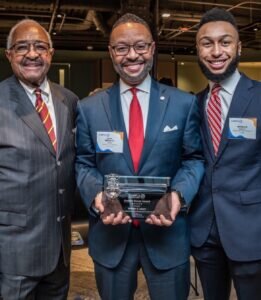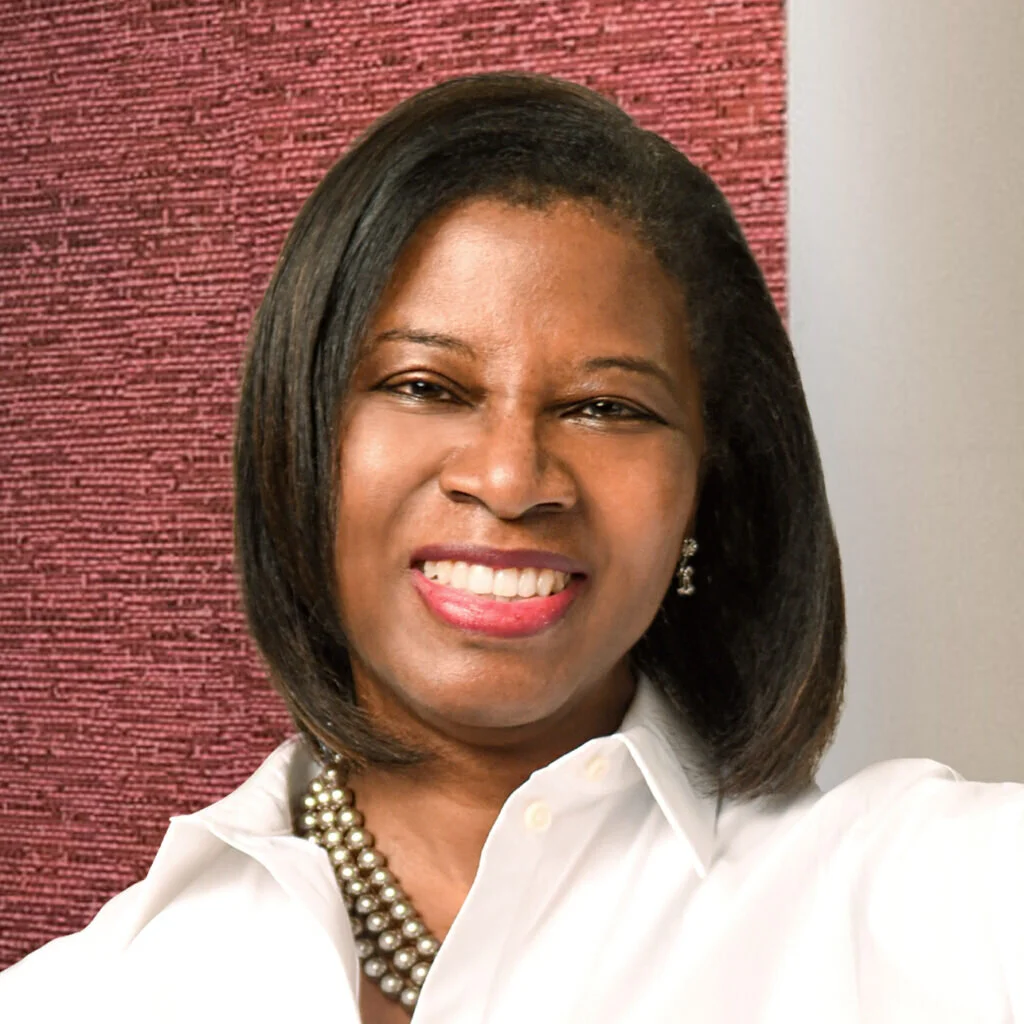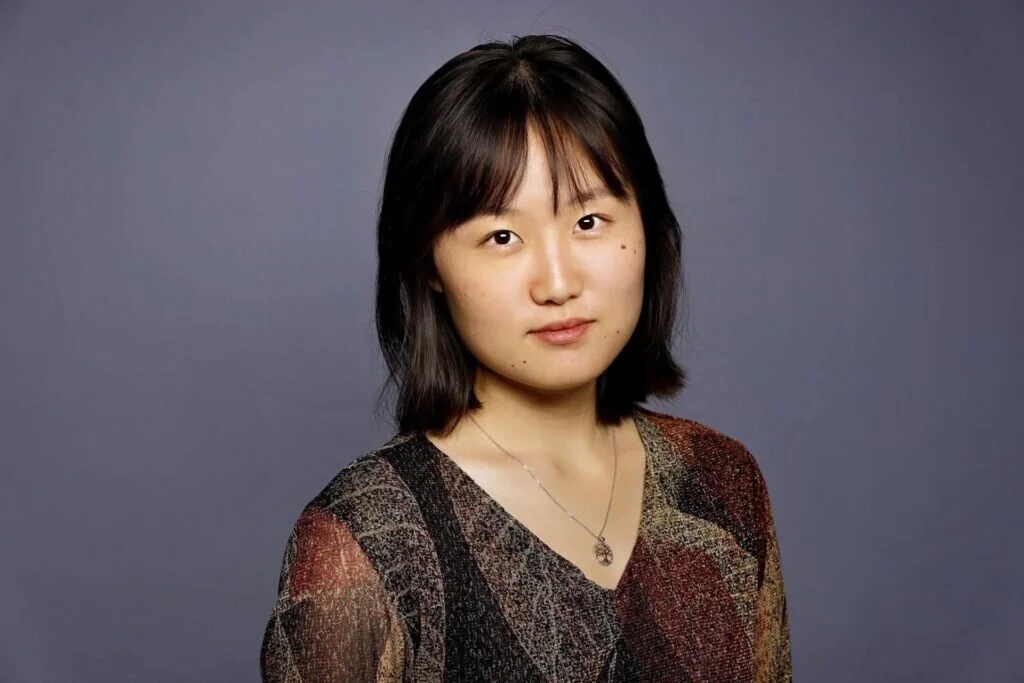Three Generations of “Bill” and the Lowry Family Philanthropic Legacy
Alford Group’s President and CEO Brenda Asare sits down with three generations of the Lowry family, Big Bill, Commissioner Bill and Bill Jr., to share their family’s incredible legacy of giving.

Left to right: Big Bill, Commissioner Bill and Bill Jr.
William E. Lowry Jr. (“Big Bill”) is a retired business executive and civic leader. In his career, he served as Vice President of Human Resources at the MacArthur Foundation and founded the Youth Motivation Program, which impacted over 1 million students. He also hosted The Opportunity Line, a weekly employment program that received both Emmy and Peabody awards.
William A. Lowry Sr. (“Commissioner Bill”) is a politician and lawyer, currently serving as Cook County Commissioner of the 3rd District. He is also President of Nyhan, Bambrick, Kinzie & Lowry, P.C., where he guides law firm policies, hiring, financial planning, attorney education and strategic planning.
William A. Lowry Jr. (“Bill Jr.”) is Assistant Attorney General of the Illinois Attorney General’s Civil Rights Bureau. Previously, he served as Associate Attorney at Nyhan, Bambrick, Kinzie & Lowry, P.C. and interned at Morgan Stanley, bringing together expertise in civil rights litigation, corporate law and public service.
In this interview, we explore the deep roots and enduring spirit of giving within the family and hear their hopes for the future of black philanthropy. This isn’t just a story about monetary donations. It’s about the profound impact of collective care, passing down values from one generation to the next and redefining what it means to be a philanthropist.
Note: This interview was edited for clarity and brevity.
Brenda: Big Bill, thinking back to your childhood, what were some of the first lessons you learned about giving back? Who were your role models, and how did they embody philanthropy in a way that resonated with you?
Big Bill: Growing up, I was like a lot of Black kids. You’re wondering, where is everything? Because we didn’t have much. We lived on the South Side of Chicago. As a kid, I used to think that the most important thing that I could do would be to try to help others who didn’t have what I had — what little bit I had — and I was encouraged by the fact that people were pretty receptive to that. Then it began to grow, like I had planted a seed. And I swore to myself, if I ever accomplished anything at all, I was going to share it with those that didn’t have it.
Brenda: Commissioner Bill, what does philanthropy truly mean? Is it about money, time, expertise or something else entirely?
Commissioner Bill: When I think philanthropy, I think about the three T’s: time, talent and treasure. While resourcing by money is truly impactful, it’s not the only way to give back. In fact, if you really want to breathe life into the word philanthropy, do so by embracing that philanthropy is defined as the desire to promote the welfare of others.
Brenda: Let’s hear from Bill Jr. You truly represent the next generation. Reflecting on your family, what has it meant to you to be philanthropic? How do you define philanthropy for your generation?
Bill Jr.: At its core, I think it’s giving support and care to improve the well-being of others. When I think of philanthropy, I think there’s a component of sacrifice. I think you’re sacrificing something you have in terms of resources to make sure that someone who is more in need has them. For my generation, it may be more time and maybe more talent right now, but it’s changing. I saw recently some online streamers who had a whole giveaway charity thing. They were getting donations and giving that away.
Brenda: Big Bill, when we think about values today in this moment, what is the single most important lesson about giving that you hope that Commissioner Bill, Bill Jr. and your other grandchildren carry with them?
Big Bill: Very early in my life, I was given the opportunity to become part of a management program at Inland Steel Company. It was called the 19th Training Group, where you would go all around Inland Steel Company, and at the end of that being placed in an area where hopefully you would rise into management and become one of the managers within Inland Steel Company. I was in that program, enjoying it, doing very well and rising through the organization.
But I felt uncomfortable for some reason, and I didn’t know what it was. After really taking inventory and thinking about it, I came to the realization that it wasn’t my going through the company, making more money and so forth, that was on my mind. But what was missing is that I had lost track of why I thought I was put on this earth, and that was to serve others. Once I decided that, and once I started doing that, I’ve been smiling ever since.
I feel very good about what Bill has done and what young Bill is doing. I didn’t talk to them, but I showed them. And now they’re showing others. That, to me, is the most important thing in the world.
Brenda: Commissioner Bill, we talk about values and giving back. You’re doing that work both in your profession and in your volunteer life. Where do these values come from? And can you share a bit about your volunteer life?
Commissioner Bill: It’s rooted in what I observed in both of my parents. They modeled service, and it was modeled in our church and in our school. One of the greatest things we can do when we talk about Black philanthropy is allow our children to see us living Galatians each and every day. Galatians says we’re here for two reasons: to love and to serve others. It is that simple.
I serve as Vice Chair of the Cook County Health Board of Directors. One of the things that I am most proud of is my small role relative to the Provident Scholarship Fund. Over the last three years, we have resourced our students from our communities as they pursue careers in healthcare. And just this last spring, we resourced our students to the extent of $1,750,000. I have been positioned, really by God, to impact in a generational way. I’m very grateful to have seen it modeled, and I’m equally grateful to be able to now keep the ladder down as I go forward.
Brenda: As part of the younger generation, do you think that your approach to philanthropy and your motivations are different from your father and grandfather?
Bill Jr.: I think how we all do those things is very similar. It’s how it looks is what differs. For me, I do it via the law, and that’s my passion. That’s how I think. My father does it through politics and service as a public official, which is just as important. You’ve got to have the laws, regulations and ordinances, then the lawyers to try to enforce and protect. My grandfather did it from HR, from within organizations. He looked out for people at the most ground level, helping them to have resources.
My grandfather told me before: the spokes of the wheel are just as important as the tires, the rims and all that. You need people to connect people. Our real purpose is that we work to connect people to resources and other people that can help fill a need.
Brenda: Big Bill, when you think about the legacy you are building, what do you hope people will say about the way you’ve given? How do you envision your giving creating a ripple effect for generations to come?
Big Bill: I want to look at my son and my grandson and see not only how they’ve progressed, but what their priorities are in life. They’re sacrificing themselves, their time, their energy, their love, in areas where it’s really needed, so others can be nourished by their thoughts and deeds. To me, that is the most important thing, and I want to see that continue. And I want to see their children do the same thing too.
Brenda: Commissioner Bill, what advice do you give to nonprofit organizations who are looking to engage with donors of color? There’s a lot of research out there indicating that the number one reason that donors of color don’t give is because they aren’t asked.
Commissioner Bill: I’m not surprised to hear that that research is out there. Often because of implicit bias, there’s certain expectations and beliefs about our community which just aren’t accurate. I serve as chair of the Lake Forest College Board of Trustees. I’m one of three African Americans on that board, but my position is one based on years and years of relationship, and given that I’m in this role, I’m pushing to make sure those on the board realize the value of diversity and different opinions. You learn the most from people who are different than you, not like you.
Bill Jr.: We always use metaphors, analogies, and all this a lot in this family. “Rising tides lift all boats.” “You’re only as strong as your weakest link.” We are a lot more powerful when we are taking care of those who are most in need among us. It helps everybody. If somebody helps and gives back in those ways, eventually you can be assured by giving philanthropy to those in need, you’re creating future philanthropists and those people are going to benefit your kids, your grandkids, your great-grandkids and the society overall.
Big Bill: Most of these organizations have to change their request, their recruitment and their needs. If you have a give-or-get, let’s say a $20,000 give-or-get, that’s beyond most of the people here who have a great deal to give that organization. They can’t give them $20,000 to give-or-get, but they can give them their attention and their time and their representation that actually increases their value and participation within the community. Until those things can come together, you’re not going to have the kind of organization that you need. And when they move forward, so will the city, so will the state, so will the country.
Brenda: I’d love to just wrap up with any last thoughts from each of you as you think about Black philanthropy, the future of Black philanthropy. What excites you the most? What’s your collective hope as we go forward?
Big Bill: Patience is very important, but so is being genuine. And if you’re not really interested in doing something, leave it alone. And what is it you feel you can do, and you want to do, and you can afford to do, and then make up your mind to do it because nobody’s going to come and do it for you.
Commissioner Bill: Black philanthropy is directly tied to our community having increased economic equity and healthcare equity. And when we get to a point in our community that we’re not just trying to go day by day and make sure our kids are getting something in their bellies, it’s going to be easier to envision giving back to others.
Bill Jr.: When you’re creating a stronger environment around you, it also helps strengthen you. And then vice versa, it creates a cycle. It creates momentum. So, I would say: think of yourselves long-term. Co-sign equity is key, so start investing now in yourselves and in others, because it will pay dividends.
Thank you, Big Bill, Commissioner Bill and Bill Jr., for showing us that while the methods of giving may change, the heart of it remains the same, building a stronger and more supportive community. Your stories are a testament to the power of generational giving and a beacon of hope for the future of black philanthropy.
To watch the full interview with the Lowrys, visit this link.



